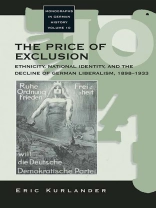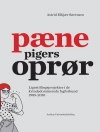‘The failure of Liberalism’ in Germany and its responsibility for the rise of Nazism has been widely discussed among scholars inside and outside Germany. This author argues that German liberalism failed because of the irreconcilable conflict between two competing visions of German identity. In following the German liberal parties from the Empire through the Third Reich Kurlander illustrates convincingly how an exclusionary racist Weltanschauung, conditioned by profound transformations in German political culture at large, gradually displaced the liberal-universalist conception of a democratic Rechtsstaat. Although there were some notable exceptions, this widespread obsession with ‘racial community [Volksgemeinschaft]’ caused the liberal parties to succumb to ideological lassitude and self-contradiction, paving the way for National Socialism.
Inhoudsopgave
Acknowledgments
Introduction
Chapter 1. The Genesis of Völkisch Liberalism in Schleswig-Holstein, 1898–1918
- Introduction
- Völkisch and Universalist Paradigms of Regional Identity
- A National and Social Liberalism
- The Schücking Affair and Breaking the Bülow Bloc, 1907–1912
- Nationalism, Ethnic Preoccupations, and the Coming of War
- Conclusion
Chapter 2. Decisive Liberalism and the Challenges of Völkisch-Nationalism in Silesia, 1898-1918
- Introduction
- Jews, Poles, and Other Silesians
- “Decisive Liberalism” Challenged, 1898–1907
- “A Liberalism Which Does Not Deserve Its Name”
- The Divisiveness of Total War
- Conclusion
Chapter 3. Republican Particularism and the Creation of an Alsatian Liberal Counterculture, 1898-1918
- Introduction
- The Origins of Republican Particularism
- Liberal Unity and the End of Opposition, 1898–1907
- Striking A Blow for “Progress”: The Fortschrittspartei Takes the Reins
- Alsace at War
- Conclusion
Chapter 4. The Strengths and Weaknesses of Völkisch Liberalism in Schleswig-Holstein, 1918-1933
- Introduction
- The Apotheosis of Völkisch Liberalism
- The Challenges of Preserving Liberal Democracy, 1918–1924
- Völkisch Liberalism and the Bürgerblock, 1924–1928
- Völkisch Liberalism on the Brink, 1928–1933
- Conclusion
Chapter 5. The Price of Universalism in Weimar Silesia, 1918–1933
- Introduction
- Völkisch Ideologies and Universalist Minorities within Silesian Liberalism
- Decisive Liberalism Divided, 1919–1922
- Solidarity and Decline, 1922–1928
- The Search for Alternatives: A Last Chance for Silesian Liberalism
- Conclusion
Chapter 6.The Victory of Republican Particularism in Alsace, 1918–1933
- Introduction
- The Question of Autonomy: Race, Culture, and Identity in the Third Republic
- Be Careful What You Wish For: The Liberals Embrace the Republic
- The Autonomist Challenge 1924–1930
- The Republican Settlement 1930–1933
- Conclusion
Conclusion
Bibliography
Index
Over de auteur
Eric Kurlander received his Ph D from Harvard University and is now Assistant Professor of Modern European History at Stetson University. He has published articles on liberalism, anti-Semitism and political culture in Imperial and Weimar Germany, he authored a book studying the fate of bourgeois republicans in the Third Reich, Living With Hitler: Liberal Democrats Between Resistance and Collaboration, 1933-1945 (Yale UP, 2009).












